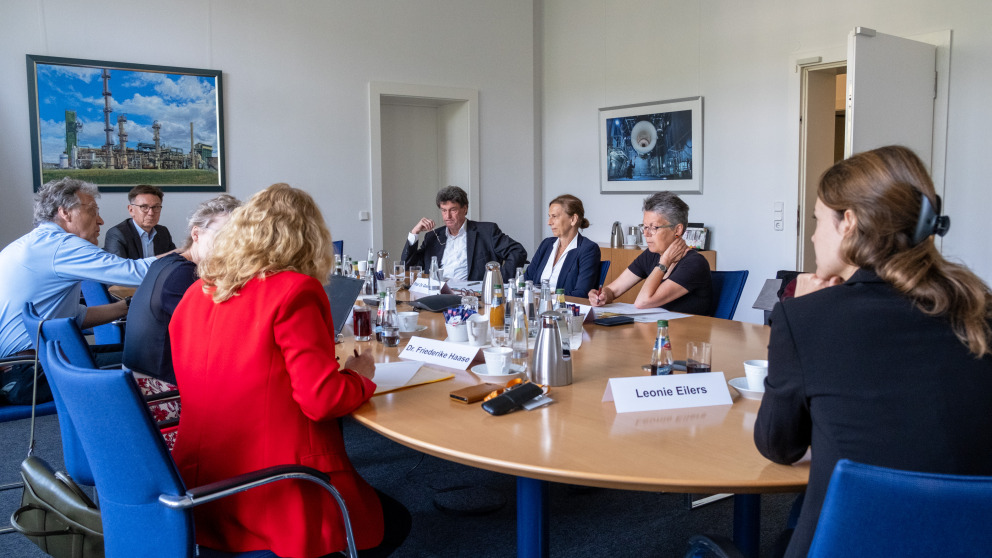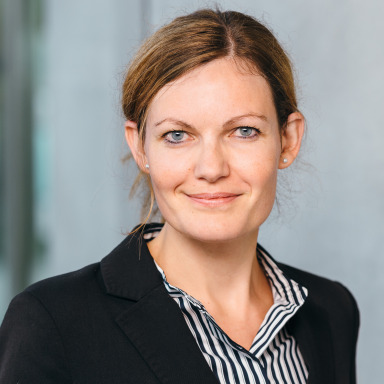Recommendations for the Transition to Sustainable Land-Use in Brandenburg
23.05.2024
Brandenburg Sustainability Advisory Board presented its recommendations for a transition to sustainable land-use to the state government in Potsdam today. Drawn from the recent policy brief "Multiple-benefit Strategies for a Land-Use Transition in Brandenburg", the recommendations promote an approach to land-use management that operates within the planetary boundaries and upholds social standards. State Secretary Friederike Haase, who accepted the recommendations on behalf of the government, stated at the reception: “These recommendations cover a wide range of topics and will provide valuable input for our work. I would like to extend my thanks to the Advisory Board for this contribution.”

The state government of Brandenburg adopted a new strategy for sustainable development in early March. The policy brief, which was prepared by Uta Steinhardt (Eberswalde University for Sustainable Development and member of the Advisory Board), presents various options for achieving the strategy’s goals, with a focus on securing multiple benefits through an integrated approach to land stewardship that combines conservation with multiple forms of land use.
The Sustainability Advisory Board developed the following recommendations based on the policy brief:
- Agriculture: Efforts should be pursued to promote and support the coexistence of different forms of agriculture as well as the uptake of new practices such as conservation farming and regenerative agriculture.
- Food systems: Forward-looking policy must equally take into account the needs of producers and consumers, environmental concerns, and the interests of future generations. This includes creating the market and regulatory conditions necessary to support a food system that accounts for environmental, health, and social concerns within a holistic understanding of sustainability.
- Biodiversity and renaturation: Efforts to protect and enhance biodiversity should be pursued across all forms of land use. Brandenburg should work to become a frontrunner in the rewetting of moorland and renaturation of floodplains, and business models for their management should be developed.
- Sustainable urban development: Housing and construction account for over 40 percent of all CO2 emissions in Germany. Future policies and measures should prioritise saving space through redensification and flexibilisation of living space, the use of building materials that can be reused or recycled, and housing concepts that use renewable energies.
- Integrated regional planning: Brandenburg’s regional planning bodies have sufficient expertise to adopt the multiple-benefit strategy outlined in the policy brief in statutory planning processes. They must be equipped with the necessary resources and responsibilities in order to achieve this.
The Advisory Board believes that land use management will present a significant challenge for the state government in the years ahead, said the Vice Chair chair of the Advisory Board, Gesine Grande (BTU Cottbus-Senftenberg) at the presentation. "Brandenburg can lay the foundations for a healthy and environmentally-friendly way of life and minimise future adaptation costs by prioritising sustainable land use as early as possible."
State Secretary Haase said: "Land is a valuable resource. This makes a balanced and sustainable approach to land management all the more important. The agricultural sector makes a significant contribution to land management and is an important economic and social factor in rural areas. We must build on this foundation with the aim of safeguarding food and energy security, protecting jobs and rural value chains, and securing biodiversity. Diversity is good for our soils. Likewise, if we wish to improve sustainability, we must identify what unites us and work together to identify solutions, even in the face of diverging views. This ability to exchange ideas is central to our society".
Brandenburg Sustainability Advisory Council was appointed by the state government in February 2021 for the duration of its seventh legislative term. It maintains a coordination office in the State Chancellery and it is supported by scientists at the Research Institute for Sustainability - Helmholtz Centre Potsdam (RIFS). Ortwin Renn chairs the panel of six experts. Brandenburg Sustainability Advisory Board supports the ongoing development of the state’s strategy for sustainable development, advises government on sustainability issues and works closely with the Sustainability Platform to facilitate the broad participation of civil society actors.
The Advisory Board has worked on four key topics to date (decarbonization of the economy, water, social sustainability and the land-use transition). The Advisory Board will convene for its final meeting on 10 July 2024. Find out more here: Scientific Support for Brandenburg's Sustainability Advisory Board
Contact

Solene Droy
